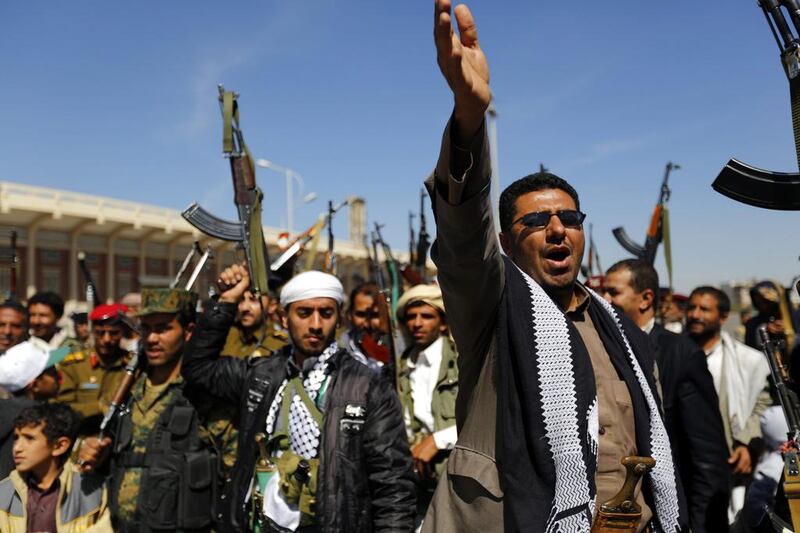Congress Republicans on Wednesday released a comprehensive policy proposal to impose the largest sanctions measures to date on Iran that entail designating the Houthis in Yemen as a terrorist organisation.
The 111-page-plan, released by the Republican Study Committee in Congress and authored by 13 Republican members on the committee, strikes a hawkish tone on foreign policy by advocating increasing of sanctions on Iran, halting aid to Lebanon, designating the Houthis, considering sanctions against former Lebanese foreign minister Gebran Bassil and ending waivers to Iraq.
While the document acknowledges that unlike China and Russia, “Iran is not a great power or strategic competitor” to the United States, it describes it as a “significant challenge as a rogue regime backed by a military and intelligence apparatus while being the world’s leading state sponsor of terrorism.”
“It has given aid and comfort to Hamas, Hezbollah, Al Qaeda, and the Taliban, as well as other Iranian-backed terrorist militias,” the Republican congressional study read.
It includes 25 policy recommendations on Iran, some are tabled in sanctions bills inside the proposal.
The recommendations include triggering snapback sanctions; extending a UN arms embargo; directing the Department of the Treasury to sanction the commander of the IRGC’s Aerospace Force Amir-Ali Hajizadeh and imposing sanctions on Iran’s petrochemical, financial, automotive, and construction sectors.
It also calls for imposing sanctions on the Instrument in Support of Trade Exchanges (INSTEX); requiring the Office of Foreign Assets Control (OFAC) to broaden the scope of activities constituting ‘significant support’ to Iran’s shipping sector; codifying and expanding current human rights sanctions on Iran; sanctioning Iranian Supreme Leader Ali Khamenei’s financial empire; enacting the Iran Human Rights and Hostage-Taking Accountability Act and the Stop Corrupt Iranian Oligarchs and Entities Act.
Regionally, these recommendations on Iran include designating a number of Iranian-backed proxy militias in Iraq and Syria foreign terrorist organisations, blocking the funding for the Iraqi Ministry of Interior and Federal Police until certain safeguards are met; cutting all funding for US security assistance to the Lebanese Armed Forces (LAF); prohibiting the sending of taxpayer money to the International Monetary Fund (IMF) to bail out Lebanon; expanding sanctions on Hezbollah and its allies in Lebanon; enacting a statement of policy supporting the Trump administration policy of political transition in Syria and withdrawal of all Iranian forces from Syria; requiring the Department of Defence to produce a feasibility assessment of a no-fly zone over Idlib; sanctioning the Houthis in Yemen as a foreign terrorist organisation and codifying sanctions on those supporting the Houthis and destabilising Yemen; refraining from cutting arms sales to Saudi Arabia and the UAE.
On the designation of the Houthis, the authors urge Congress to “pass legislation requiring the examination of whether the Houthis meet the criteria to be designated as an FTO because of its ties with other terrorist organisations, such as the IRGC, and its terrorist attacks against Yemeni civilians and Saudi Arabia”. But they make it clear in the recommendations that they support such designation.
On Iraq, it recommends that “Congress should require the president to designate Ameri, the Badr Corps, along with other Iranian-backed militias in Iraq, such as Kata’ib Imam Ali, Suraya Al Khorasani, Kata’ib Sayyid al-Shuhada, Liwa Abu Fadl Al Abbas, Hara- kat Al Awfiya, Harakat Jund al-Imam, and Sarayya Ashoura.”
On Lebanon it calls for sanctions on Hezbollah's allies. It mentions “[Former] Foreign Minister Gibran Bassil and head of the Amal Movement and the Speaker of the Lebanese Parliament Nabih Berri” by name.
Ryan Bohl, an analyst at the US intelligence company Stratfor, said the proposal confirms the hawkish trend inside the Republican Party but did not expect these proposed sanctions to pass.
US Secretary of State Mike Pompeo has opposed cutting aid to Lebanon and ending waivers to Iraq in the past.
"It seems unlikely to pass, especially with the November election coming up and Democrats not wanting to look like they're creating overseas tension," Mr Bohl said. But the expert told The National that the document brings more focus on Iraq and Lebanon in countering Iran's influence.








